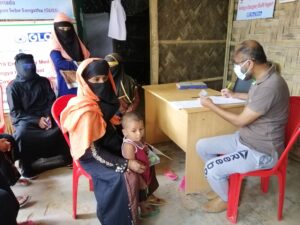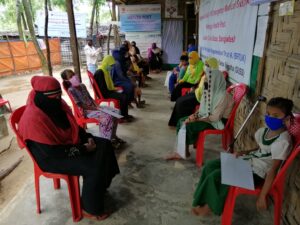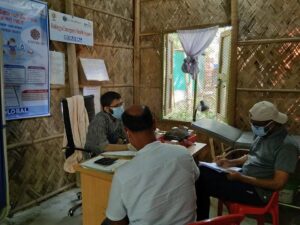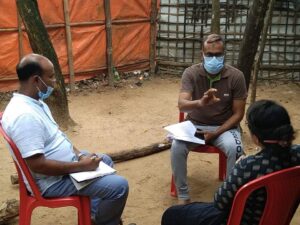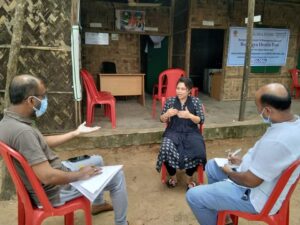Mid-Term Evaluation of Health Post Services for Rohingya Refugees and Host Community in Cox’s Bazar.
Our consultancy conducted an external mid-term evaluation of the Health Post Services for Rohingya Refugees and Host Community in Cox’s Bazar, commissioned by Global Unnayan Seba Sangstha (GUSS). The primary objective of this evaluation was to assess the efficiency, effectiveness, relevance, partnership and cooperation, sustainability, and impact indicators of the health project.
🚀 Key Objectives of the Evaluation:
✅ Assess Project Performance – Evaluating efficiency, effectiveness, and sustainability to ensure optimal healthcare service delivery.
✅ Review Implementation Process – Analyzing guidelines, service protocols, management structures, monitoring systems, and progress reporting mechanisms.
✅ Measure Progress Against Targets – Examining achievements at the output level to track project impact and suggest improvements.
Through a comprehensive assessment approach, our consultancy provided data-driven insights and strategic recommendations to enhance service delivery, improve project sustainability, and ensure long-term benefits for both Rohingya refugees and the host community.
রোহিঙ্গা শরণার্থী ও স্থানীয় জনগণের জন্য স্বাস্থ্যসেবা কার্যক্রমের মধ্য-মেয়াদি মূল্যায়ন
রোহিঙ্গা শরণার্থী ও স্থানীয় জনগণের জন্য স্বাস্থ্যসেবা কার্যক্রমের মধ্য-মেয়াদি মূল্যায়ন
আমাদের পরামর্শক দল গ্লোবাল উন্নয়ন সেবা সংস্থা (GUSS) কর্তৃক পরিচালিত রোহিঙ্গা শরণার্থী ও স্থানীয় জনগণের স্বাস্থ্যসেবা কার্যক্রমের মধ্য-মেয়াদি মূল্যায়ন সম্পন্ন করেছে। মূল্যায়নের মূল লক্ষ্য ছিল প্রকল্পের দক্ষতা, কার্যকারিতা, প্রাসঙ্গিকতা, অংশীদারিত্ব ও সহযোগিতা, স্থায়িত্ব এবং সম্ভাব্য প্রভাব নির্ণয় করা।
🚀 মূল মূল্যায়ন লক্ষ্যসমূহ:
✅ প্রকল্পের কার্যকারিতা মূল্যায়ন – স্বাস্থ্যসেবা প্রদানের দক্ষতা, কার্যকারিতা ও স্থায়িত্ব পর্যালোচনা।
✅ বাস্তবায়ন প্রক্রিয়া পর্যালোচনা – সেবাদান পদ্ধতি, পরিচালনা কাঠামো, মনিটরিং ও অগ্রগতির প্রতিবেদন পর্যালোচনা।
✅ লক্ষ্যমাত্রার সাথে অগ্রগতি পরিমাপ – আউটপুট স্তরে প্রকল্পের অর্জন নির্ণয় ও উন্নয়নের জন্য সুপারিশ প্রদান।
একটি ব্যাপক মূল্যায়ন পদ্ধতি অনুসরণ করে, আমাদের পরামর্শক দল তথ্য-ভিত্তিক বিশ্লেষণ ও কৌশলগত সুপারিশ প্রদান করেছে, যা স্বাস্থ্যসেবা কার্যক্রমের উন্নয়ন, প্রকল্পের স্থায়িত্ব নিশ্চিতকরণ এবং শরণার্থী ও স্থানীয় জনগণের দীর্ঘমেয়াদী কল্যাণে সহায়ক হবে।
